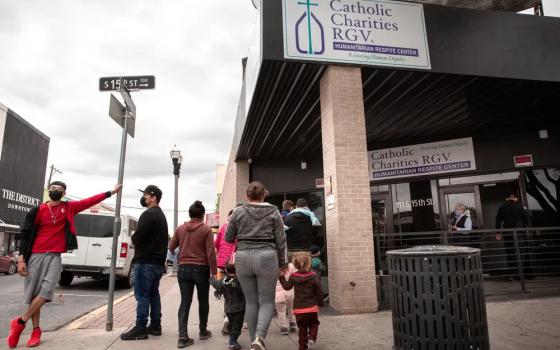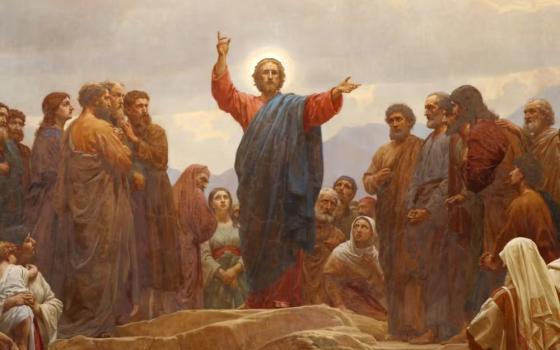
LOS ANGELES -- Looking ahead to his retirement in February, Los Angeles Cardinal Roger M. Mahony wrote in his blog that he intends to spend the coming months and years "walking in solidarity with the 11 million immigrants who have come to the United States to improve their own lives and the life of our country."
He also plans to spend time advocating on behalf of the "silent millions."
In a column posted on the archdiocesan Web site Jan. 16, Mahony encouraged people to get to know immigrants as individuals, not as stereotypes, and urged all levels of society -- business and professional leaders, schools and Catholic organizations -- to put a human face on immigrants and help them "find their rightful place in our society."
"We will discover that their core values are the same as ours, and that they are here to help enrich, not diminish, our fine country," he wrote. "Once we put a human face on an immigrant, the stereotypes and across-the-board characterizations begin to dissolve."
Mahony turns 75 Feb. 27. While canon law requires bishops to submit their resignations when they turn 75, they're not necessarily accepted immediately. However, Mahony has signaled that he expects his birthday to be the date he retires and when Coadjutor Archbishop Jose H. Gomez will succeed him.
In his blog article, Mahony recalled first encountering immigrants who became his friends when he was growing up in the San Fernando Valley and his family's business employed migrant workers. As a seminarian, he joined priests for Mass at farm labor camps for the temporary workers from Mexico who were admitted under the bracero program.
After his ordination, he said, he was "always deeply touched by the faith, traditions, and commitment to family on the part of countless immigrants" in the San Joaquin Valley where he worked. "Their hard work and sacrifices were evident at every turn. The efforts of Cesar Chavez to improve the salaries and working conditions of thousands of farmworkers in our state greatly inspired me."
Later as bishop in the Fresno and Stockton dioceses, "I was attracted to these people because of their faith and love for the church. They were always anxious to help whenever asked, whether by assisting others in need or by lending a hand in the parish or the diocese."
From that base, Mahony said he has been "constantly called and challenged by the words of Jesus: 'For I was a stranger and you welcomed me' (Matthew 25:35), echoing God's mandate to his people in the Old Testament."
He continued, explaining that "over the years immigrant peoples have become very dear to me, and Jesus continues to call me to walk with them on their journey."
Life is not easy for many immigrants, the cardinal wrote. With the economic downturn and resulting job losses, home foreclosures and other sacrifices, "many voices blame immigrant peoples for our economic woes. This is unjust and flies in the face of the facts."
He said 11 million "of our immigrant brothers and sisters are misunderstood and maligned. Without legal documents, their livelihoods and their very lives are at risk."
"They live in the shadows of our society. They are easy targets of blame for everything that has gone wrong, and is going wrong, with our country," he said. "But a little historical perspective sheds light on our current situation and gives hope for the future, helping us to see immigrants not as 'those people,' but as brothers and sisters living in our communities with the same longings and aspirations as all Americans."
He said that if people would "refresh our memories as a nation," they would see that immigrants — with or without documents — are no cause of concern when unemployment is low and the economy is sound.
Mahony said he's encouraged by the prospects of helping "these silent millions in our midst." Polls show a majority of Americans "believe our borders need to be made more secure, and that illegal immigration needs to be controlled," he said. "But the same polls reveal that a majority of people polled (63 percent in one poll, 81 percent in another) are open to a structured path to earned citizenship for those who are here in our country without papers but who pass background checks, pay fines, and have jobs.
"These high percentages tell me that our Catholic Gospel values and the American spirit are still alive among us," the cardinal continued. "I suspect that many anti-immigrant feelings and sentiments arise from frustration with the seeming inability, or the unwillingness, to fix our broken immigration system."
He encouraged people to seek more information about immigration issues from the websites of Justice for Immigrants, www.justiceforimmigrants.org, the Faces of Immigrants, www.facesofimmigrants.org, sponsored by the Los Angeles Archdiocese; and the Migration Policy Institute, www.migrationpolicy.org.



